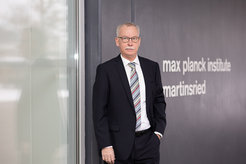Dr. Paul Janssen Award for Biomedical Research for F.-Ulrich Hartl

Proteins are the molecules in cells that drive almost every biological process. Through their collaboration, Hartl and Horwich discovered that proteins are folded into their proper shape with the help of other specialized proteins called molecular chaperones. This process allows the proteins to reach their functional shape, which enables them to perform their biological function. These insights have broad implications throughout biology and medicine, and hold promise for the development of new therapeutic strategies for treating diseases like Parkinson’s, Alzheimer’s and cancer, in which defects in protein folding are involved.
“Drs. Hartl and Horwich combined their brilliant insights and elegant approaches to overturn the dogma of their day about the process of protein folding,” said David Julius, Chair of the 2019 Dr. Paul Janssen Award selection committee. “Their studies revolutionized our understanding of how proteins achieve their shape and revealed how defects in this process may contribute to a variety of disorders ranging from metabolic to neurodegenerative diseases.
Dr. Paul Janssen Awardee 2019 F.-Ulrich Hartl
About F.-Ulrich Hartl
F.-Ulrich Hartl was born in 1957. He studied Medicine at the University of Heidelberg, where he also obtained his doctoral degree. Hartl joined Walter Neupert’s research group at LMU as a postdoc and then became a group leader in Neupert’s department. A fellowship from the German Research Foundation (DFG) enabled him to undertake research at the University of California, Los Angeles. He did research as a Professor and Howard Hughes Medical Investigator at the Sloan Kettering Institute and Cornell University in New York, USA. In 1997, the Max Planck Society succeeded in enticing the renowned scientist back to Germany. Since then, he has been Director and head of the Department of Cellular Biochemistry at the Max Planck Institute of Biochemistry. Within the last years he was honored with multiple scientific prizes including 2002 the Gottfried Wilhelm Leibniz Prize, 2011 the Albert Lasker Award for Basic Medical Research, 2012 the Shaw Prize together with Horwich and 2016 the Albany Medical Center-Prize together with Horwich and Susan Lee Lindquist. In 2018, Hartl was inducted into the Hall of Fame of German Research.
Further information on research by F.-Ulrich Hartl
Movie: Protein Folding (German)
Movie: Chaperones - Folding helpers in the cell (English)
About the Max Planck Institute of Biochemistry
The Max Planck Institute of Biochemistry (MPIB) belongs to the Max Planck Society, an independent, non-profit research organization dedicated to top level basic research. As one of the largest Institutes of the Max Planck Society, 850 employees from 45 nations work here in the field of life sciences. In currently eight departments and about 25 research groups, the scientists contribute to the newest findings in the areas of biochemistry, cell biology, structural biology, biophysics and molecular science. The MPIB in Munich-Martinsried is part of the local life-science-campus where two Max Planck Institutes, a Helmholtz Center, the Gene-Center, several bio-medical faculties of two Munich universities and several biotech-companies are located in close proximity. http://www.biochem.mpg.de
About the Dr. Paul Janssen Award for Biomedical Research
The Dr. Paul Janssen Award for Biomedical Research was established by Johnson & Johnson in 2004 to honor the memory of Paul Janssen – founder of Janssen Pharmaceutica. Since its inception, the Award has recognized 16 outstanding scientists, three of whom have gone on to win the Nobel Prize for the same work. Winners are chosen by an independent selection committee of the world’s most renowned scientists. The Award, which includes a $200,000 prize, is presented at ceremonies in the U.S. and Belgium in September. http://www.pauljanssenaward.com/












